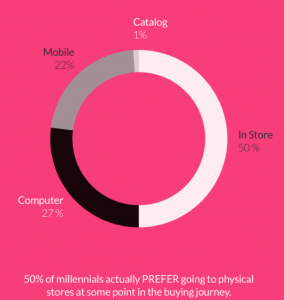
At one time or another, you’ve had a frustrating online experience with a brand. Whether it was trying to access a website that took forever to load, or a website that kept important information well-hidden, or you left a website having no clue what the brand offered or how to get in touch with them.
This has happened to everyone and it’s a major failure for brands. The good news is there are several simple considerations for significantly improving the usability of a website and all digital marketing assets. Let’s take a look at these critical considerations.
The User Experience
It’s Not About You, It’s About Me
The digital user experience (or UX) is a hot topic that starts with one fundamental understanding: your B2B web design is not about your brand, it’s about your website visitors. With all the rhetoric out there, this is the essential truth and it’s critical to keep this in mind whenever you build, update, or edit your website.
Remember that you may know your website inside and out, but a visitor arriving on the homepage or a landing page for the first time has no experience with your brand’s website. Every decision your make on your website or any changes you implement should always start with the question: How does this impact/help/guide the user?
The user experience matters in digital marketing.
Speed
I Want to Go Fast!
In a world of super-fast Wi-Fi and 4G networks, speed matters. For this reason, you absolutely MUST do everything you can to increase the speed at which your website loads. This covers a wide variety of areas – from web hosting providers, how the website is coded, image size, caching and more. Always be sure to do your due diligence before selecting a WordPress website hosting company as this can have one of the largest impacts on the speed of your website.
There are a variety of free website speed tests out there, including the Google PageSpeed Insights Tool. Working with an experienced web developer ensures that you are taking every opportunity to increase the speed of your B2B website without sacrificing functionality.
Functionality
What’s in It for Me?
Speaking of functionality, another critical consideration for the user experience is that your website actually helps the visitor find what they need. If your website has a great, educational blog, but it’s buried deep in the navigation or is only accessible through the footer of the website – it’s not a value for the visitor. Additionally, you must continually check your website to make sure everything is working properly – videos should play when clicked on, menus should drop down when selected, pages should open when chosen from the navigation, images should display without distortion on the page, links should not be broken, etc.
Along with functionality, a website and all digital platforms should be accessible. Web content accessibility ensures that your design, layout, and visuals don’t discriminate against certain portions of the population. Not every potential client is 25 years old with perfect vision and flawless hearing – keep these things in mind to ensure your user experience is functional and accessible to everyone.
Minimizing Clicks
It’s Too Much Work
The last critical consideration we are going to discuss is the number of clicks it takes a website visitor to get the information they need. Think of it this way – the easier you make it to do business with your B2B brand, the better. Don’t make your potential clients jump a bunch of hoops to learn more about your product/service, get in touch with you, view your content, ask a question, or connect with you on social media. Never make a prospect or client hunt for important information (like phone numbers, service offerings, contact forms, etc.)
While it can take some creativity and compromise, always focus on minimizing the clicks to get information on your website. You can achieve this in your B2B marketing by putting the most important information on the top-level navigation and minimizing the number of sub-menus. Working with experienced web designers and web developers also ensures that the important information on your website is intuitively easy to find.
Usability Leads to Trust
Don’t make visitors think you are hiding anything from them. Taking these critical considerations into account as you build your website ensures you are providing an excellent user experience and a positive first impression of your B2B brand. A great user experience leads to trust in your brand, which helps to convert a potential client into a qualified new client lead.
Digital & Social Articles on Business 2 Community(83)
Report Post







